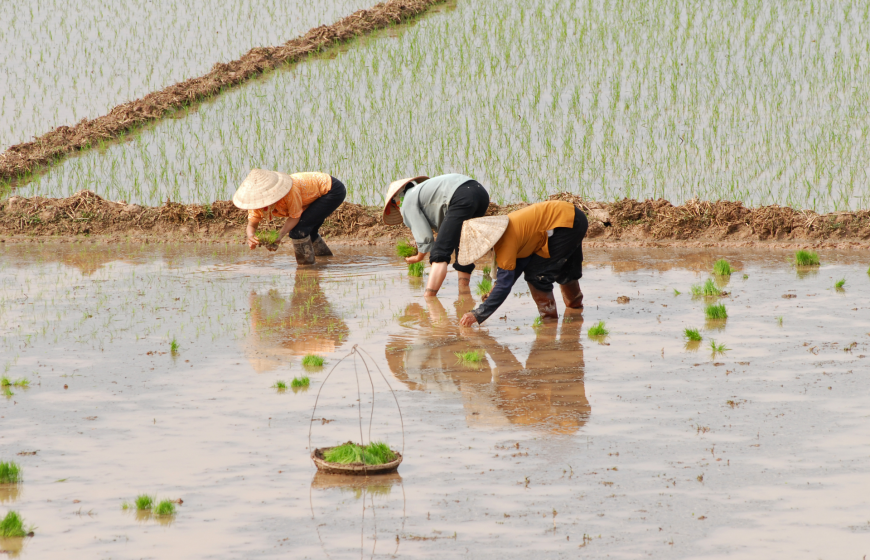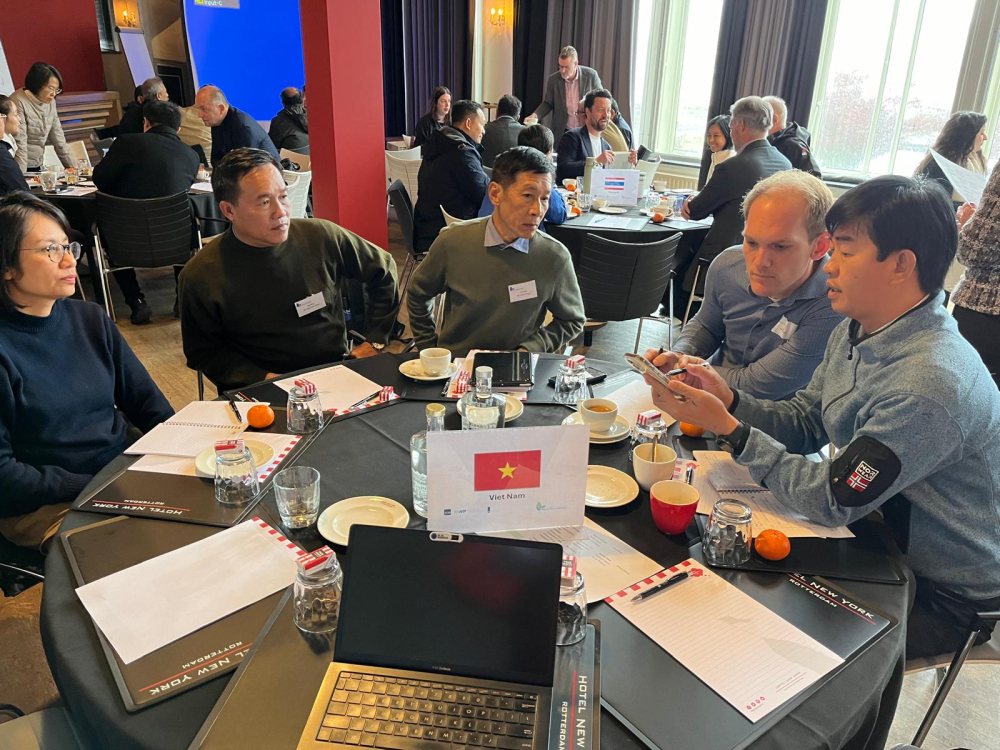Event
7 April 2025 - 11 April 2025 Utrecht, the NetherlandsAsia Netherlands Water Food Learning Week

Asian Development Bank (ADB) and the Netherlands Water Partnership (NWP) will be hosting the Asia Netherlands Water Food Learning Week (ANWFLW) in Utrecht, the Netherlands, from 7 to 11 April. The ANWFLW is a week-long intensive programme that will bring together seven project teams from across ADB’s developing member countries with water experts from the Netherlands.
Netherlands Food Partnership (NFP), Wageningen University and Research (WUR), Netherlands Enterprise Agency (RVO), and other Dutch organisations contributing to the programme provide strategic support, optimising the learning experience.
Water is often overlooked in food system design, underscoring the need for a shift to water-responsible systems that link food with water and consider climate change, biodiversity, and energy impacts. The ANWFLW emphasizes the critical role of an effective water management for achieving sustainable global food security and the importance of integrated water-food strategies such as climate-smart agriculture and water-efficient technologies to enhance agricultural productivity and resilience.
By working together intensively, the challenges posed by the project teams will be addressed using experiences from a Dutch and international context and will be shared in lectures, interactive sessions, field visits, and feedback sessions. By jointly discussing challenges and solutions the teams and experts strive to make them adaptable to the specific project contexts in participating developing member countries (DMCs).
The initiative is a proven concept with a long history. The first Asia-Netherlands Water Learning Week took place in 2012, and NWP has been involved since the beginning.
Enhancing water and food systems
During the learning week, participants will explore how water can be a central element in the design of ADB’s investment projects focused on water and food security. The focus will be on fostering collective actions, reliable data, and a clear understanding of water’s value, which are critical for sustainable food production and water management. Topics will cover innovative farming concepts, digitalization, food production under saline conditions, climate-adaptive food production, and water management in agricultural areas, alongside strategies for prioritizing water reserves amidst competing uses.
The learning week will also encourage project teams to think more strategically about overcoming silos and fragmentation caused by institutional arrangements in DMCs and within ADB itself, which often hinder nexus thinking. Through active participation, project teams will collaborate to co-create project building blocks and potential solutions tailored to their specific contexts. Additionally, they will be tasked with suggesting ways to strengthen project integration and improve coordination, aiming to enhance the overall effectiveness of water and food security projects.

Selected projects
The ANWFLW will be attended by eight project teams representing 10 countries in Asia, including government officials from these countries, the ADB country liaisons, as well as ADB Headquarters representatives. The selected project teams from ADB’s developing member countries will focus on shared learning objectives, knowledge exchange, and actions to be implemented following the training. They will work together with dedicated experts from the Dutch water sector, mobilised by NWP.
Projects overview
Integrated Water Resources Management (IWRM) Project | Cambodia
The project enhances climate and disaster resilience for river basin groups through climate-adaptive interventions based on integrated water resources management. Its goals are to strengthen water resources planning and coordination, increase water supply capacity, and reduce flood risks in the Pursat and Sangker river basins in Pursat and Battambang provinces.
Enhancing Climate Resilience and Food Security Project | Maldives
The project supports the Maldives' climate resilience efforts by strengthening the connection between human settlements and agri-food systems. Its goals include upgrading early warning systems in Addu City and Malé, improving flood protection in Kulhudhuffushi Island, introducing climate-smart urban farming in Haa Dhaalu and Addu atolls, and providing grants to expand local businesses. Aligned with the Maldives' climate policies, the project enhances the country's adaptation capacity and long-term sustainability.
Mechanised Irrigation Innovation Project | Nepal
The proposed project will enhance year-round irrigation access for 22,400 hectares in Rautahat and Sarlahi districts, providing climate resilience and water security to rural farmers. The project will provide on-demand irrigation to 121,000 farmers with a prepaid water metering system, marking Nepal’s transition to a more resilient irrigation system. Its goals are to establish a sustainable, inclusive agricultural sector, increase productivity, improve livelihoods, and design climate-resilient groundwater irrigation systems to support diversified cropping practices.
Resilient Amu Darya River Basin Sector Development Programme | Uzbekistan
The programme tackles water resource management challenges worsened by climate change, promoting sustainable development and economic resilience. Its goals include enhancing water security through multipurpose infrastructure such as the Ayakchi and Obizarang reservoirs, supporting climate resilience with disaster risk management and innovative technologies, and strengthening institutional capacity while empowering women in water management decision-making.
Philippine solar powered irrigation project | Philippines
The project supports the government’s food security goals by promoting climate-resilient, low-carbon agriculture. Its aims include expanding irrigated agriculture with solar-powered irrigation systems for smallholder farms covering 80,000 hectares, introducing climate-smart practices for rice and other crops, and strengthening farmers' capacity to adapt to water-scarce environments through improved cropping practices, cooperative management, mechanisation, and post-harvest enhancements.
Horticulture Development in Dryland Areas Sector Project | Indonesia
The project enhances climate resilience, sustainability, productivity, and profitability of horticultural agriculture in dryland areas through integrated investments from tillage to market. Its goals include improving smallholder farmers' access to quality inputs, production systems, and post-harvest practices, introducing climate-adaptive on-farm practices, strengthening value chains in horticulture villages, and increasing institutional capacity for horticulture development.
Yellow River Basin Green Farmland and High-Quality Agriculture Development Project | China
The project addresses water scarcity and climate resilience in the Yellow River Basin, a key agricultural region in China. Its goals include strengthening institutional and technical capacities, developing green and climate-resilient agricultural production through water-saving irrigation and optimised crop composition, and enhancing agricultural value chains with smart agriculture monitoring. The project supports Henan Province and ensures the development of high-standard, climate-resilient farmland in the basin.
Climate Resilient Coffee Value Chain Project | Private Sector Operations Project encompassing India, Indonesia, Vietnam and Papua New Guinea
The project supports ECOM's working capital needs for procuring sustainably grown coffee, ensuring the growth of a creditworthy agri-merchant. Its goals include strengthening market linkages for smallholder farmers to enhance climate resilience and livelihoods, promoting sustainable agricultural practices to improve water usage, soil health, and environmental sustainability, and providing climate adaptation benefits, rural development, and improved food and water security. By ensuring reliable market access and supporting sustainable practices, the project contributes to long-term agricultural and environmental resilience.
For specific information on the attending teams and their focusses, kindly contact Arjan Braamskamp or Roy Agterbos at NWP.

